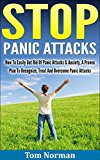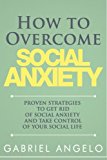Stop Panic Attacks: How To Easily Get Rid Of Panic Attacks & Anxiety, A Proven Plan To Recognize, Treat And Overcome Panic Attacks (Self Help Book, Self Help Lessons, Leadership, Leadership Lessons) Reviews
Stop Panic Attacks: How To Easily Get Rid Of Panic Attacks & Anxiety, A Proven Plan To Recognize, Treat And Overcome Panic Attacks (Self Help Book, Self Help Lessons, Leadership, Leadership Lessons)
A Proven, Step-By-Step System To Easily Get Rid Of Panic Attacks & Anxiety, A Proven Plan To Recognize, Treat And Overcome Panic Attacks
Today only, get “Stop Panic Attacks: How To Easily Get Rid Of Panic Attacks & Anxiety, A Proven Plan To Recognize, Treat And Overcome Panic Attacks” Read on your PC, Mac, smart phone, tablet or Kindle device.
This book contains proven steps and strategies on how to deal and stop panic attacks in order to live a more quality life.
Here
Price:
How to Overcome Social Anxiety: Proven Strategies to Get Rid of Social Anxiety and Take Control of Your Social Life
You Have No Right To Be Living With Social Anxiety. Take Back Your Life Now!
Are you terrified of meeting new people? Are you constantly afraid of being noticed by others and being found unacceptable in some way? Do you feel people watch you everywhere you go just waiting for you to do something wrong? Are you in a constant state of anxiety over saying or doing something embarrassing or stupid? Do you avoid social situations whenever possible in order to feel safer?
If you answ
List Price: $ 9.97
Price:





This book was such a waste of time,
Was this review helpful to you?













|Just ok,
Was this review helpful to you?













|Good basic knowledge,
Was this review helpful to you?













|I wish this book had been published years ago,
*The author forces you to distinguish whether your level, or degree of stress is above average. It seems like people who do not suffer from social anxiety, or other type of anxiety like to say things like “it’s ok, I’m stressed too” or “it’s ok. Everyone feels like that.” NO THEY DON’T. Everyone meets stress at some point, yes, but it is nothing like someone who suffers from Social Anxiety. It’s nice to know that it’s ok if your stress is a little higher than most and why,
*Psychotherapy vs. Medication. Angelo makes these two topics easily understood. He discuses different types of therapy and the three types of medication used to treat Social Anxiety (antidepressants, benzodiazepines and beta-blockers) in lay-mans terms with through clarity. I had absolutely no problem understanding what can easily be considered dry and confusing material.
*Journaling. Every therapist I’ve been to has told me to keep a journal. My job was to write in it at the end of the day to release my thoughts and close the book until the next day. Angelo calls for a different journaling process. According to this book you should ask yourself a series of questions within your journal entry each day. The questions presented really got me to look at myself a little differently and examine why I think the way I do.
How to Overcome Social Anxiety is a book I would recommend to anyone who is dealing with anxiety as I have for so long and just needs relief. I honestly think this book could be helpful for anyone dealing with any type of anxiety.
Was this review helpful to you?













|Sweaty palms? Butterflies? Is It Shyness or Something More?,
It turns out that my feelings of occasional social anxiety actually fall into the “normal” range. This book is instead geared toward people whose lives are severely impacted by a condition called “social anxiety disorder.” The author explains that it’s the third most prevalent mental health problem in the U.S., affecting millions of people, many of whom are misdiagnosed or untreated. It’s fascinating to read about, whether you actually suffer from it, perhaps have a loved one or friend whose life has become debilitating because of it, or are just checking to see whether you actually do have it.
It”s written in a user-friendly, non-technical way. It doesn’t read like a health manual, yet it is fully packed with information on everything from diagnosing the condition to ways of treating it. It does what its subtitle suggests, which is to provide strategies to get rid of social anxiety and take control of your social life.
The author describes signs and symptoms of the disorder, whether emotional, physical or behavioral. He explains potential causes for its beginnings. Then, most importantly, he offers real help in terms of ways to treat it, whether on your own or with the help of psychotherapy and medication. He also offers a relaxation technique that anyone could find helpful.
The book should be a beacon of hope for those affected by the full-blown disorder. But I think anyone can benefit from reading it. It’s not like reading something about a disease you are blessed not to have, or can’t relate to, such as cancer or MS or AIDS (all worthy topics, but probably not easy to identify with, if you or a loved one are not directly touched by the disease).
But haven’t we all at some time felt nervous making a speech, shy meeting a new person, anxious before attending a party where we barely know anyone? These are not necessarily warning flags pointing to social anxiety disorder – it’s all about the frequency and severity of the symptoms. However, the theories offered – the visualization and relaxation techniques presented – and the thought-provoking questions the author poses to the reader do have a way of bolstering confidence and acquiring a “feel good” attitude in anyone. When I finished the book, I was feeling better about myself and my overall “take” on my life, and that’s a good thing by anyone’s standards.
Was this review helpful to you?













|I enjoy Angelo’s ability to “write until it’s good,
I enjoy Angelo’s ability to “write until it’s good.” He delivers ideas and information completely, yet concisely. There’s no wading through three chapters of filler to get to the point.
It’s easy to look in retrospect at some of the anecdotes Angelo uses, especially on dealing with social anxiety while in development. I remember having grade anxiety, and it would feel crushing sometimes. Instead of completing the task to the best of my ability, I would obsess about “what if I try my best and fail?” This book has helped me understand where some of my apprehensions as an adult originally developed.
It’s hard not to self-diagnose while reading a book that dives into “signs and symptoms.” There is at least one questions or statement in that section which will make every reader step back for a minute to evaluate. Angelo’s techniques to improve are great for anybody trying to improve oneself. The relaxation side of dealing with anxiety is laid out very strategically. Angelo delivers again. This book is not just for people with a “disorder.”
Was this review helpful to you?













|